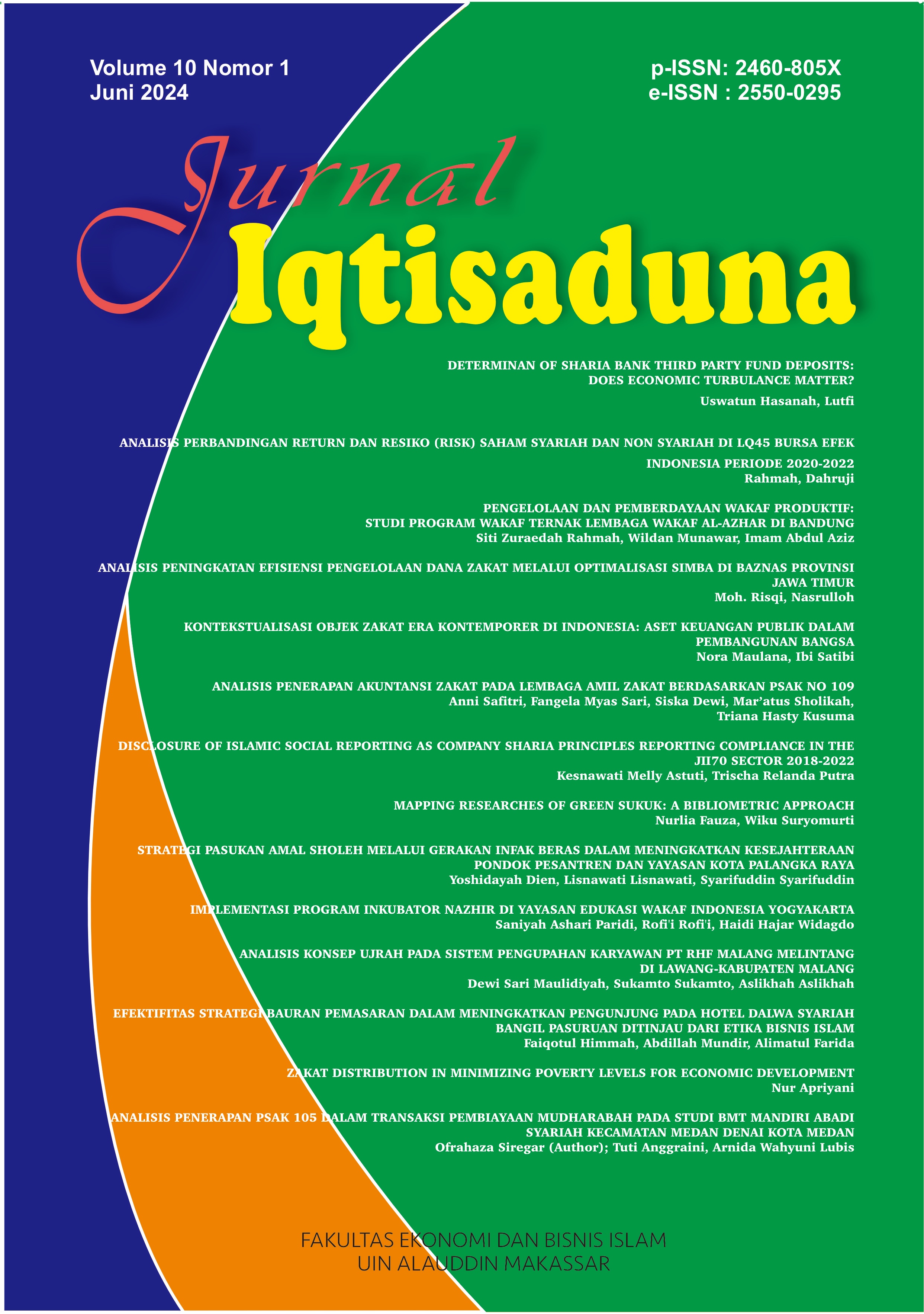Analisis Konsep Ujrah Pada Sistem Pengupahan Karyawan PT RHF Malang Melintang Di Lawang-Kabupaten Malang
Abstract
Ujrah is the payment of salary or wages promised by the first party to the second party based on the work that has been done or the results of that work. This concept emphasizes that ujrah is a reward for the work a person has done. In the context of muamalah fiqh, transactions between money and human labor are referred to as ujrah or wages. In the perspective of Islamic law, wages (ujrah) are a right obtained by individuals who have worked, and it is the employer's obligation to pay them. Wage regulation is included in the ijarah category in muamalah fiqh. Sources of Islamic law that serve as guidelines for resolving various wage problems include the Al-Qur'an, Hadith, and Ijma', as well as various other relevant legal sources. This research aims to evaluate the concept of ujrah as the basis for an employee wage system in a company context, taking into account Islamic principles and state legal policies. The research method used is a qualitative approach with a descriptive approach. Research instruments include observation, interviews and documentation. The research results show that payments to workers are adjusted to their respective fields of work. Fairness in wage payments is considered important, where workers must receive wages fairly and adequately. According to employees, the principle of fairness in paying wages is when there is no difference in treatment between one employee and another based on the work they do. Based on these results, it can be concluded that the wages received by employees are in accordance with the agreement that has been made.
Keywords: Ujrah concept, Ujrah, wages, wage system.
Downloads
References
Afzalurrahman, Rifqi. n.d. “Afzalurrahman, Doktrin Ekonomi Islam Jilid 2, 361. Ibid, 361. 9,” 9–32.
Aksin & Nur. 2018. “Jurnal Meta Yuridis Volume 1 No.2 Tahun 2018.” Meta Yuridis 1 (2): 72.
Bachri, Bachtiar S. 2010. “Meyakinkan Validitas Data Melalui Triangulasi Pada Penelitian Kualitatif.” Teknologi Pendidikan 10: 46–62.
Budijanto, Oki Wahju. 2017. “Upah Layak Bagi Pekerja/Buruh Dalam Perspektif Hukum Dan HAM.” Jurnal Penelitian Hukum De Jure 17 (3): 395. https://doi.org/10.30641/dejure.2017.v17.395-412.
Burgio, Baca Franco. 2014. “Jurnal Ummul Qura Vol IV, No. 2, Agustus 2014 1” IV (2): 1–9.
Fadli, Muhammad Rijal. 2021. “Memahami Desain Metode Penelitian Kualitatif.” Humanika 21 (1): 33–54. https://doi.org/10.21831/hum.v21i1.38075.
FAQIHAN, MOKHAMMAD RIFQI. 2015. “Sistem Pengupahan Karyawan Toko Rizquna Bandar Kidul Kota Kediri Dalam Prespektif Ekonomi Syariah.” Http://Etheses.Iainkediri.Ac.Id/, 9–32.
Ghofur, Ruslan Abdul, and Konsep Upah. n.d. Konsep Upah.
Hasdiana, Ulva. 2018a. “Menakar Pro-Kontra Hukum Ujrah Pengajar Ilmu Agama Dan Urgensinya Dalam Konsep Era Modern.” Analytical Biochemistry 11 (1): 1–5. http://link.springer.com/10.1007/978-3-319-59379-1%0Ahttp://dx.doi.org/10.1016/B978-0-12-420070-8.00002-7%0Ahttp://dx.doi.org/10.1016/j.ab.2015.03.024%0Ahttps://doi.org/10.1080/07352689.2018.1441103%0Ahttp://www.chile.bmw-motorrad.cl/sync/showroom/lam/es/.
———. 2018b. “Upah Dalam Presektif Islam.” Analytical Biochemistry 11 (1): 1–5. http://link.springer.com/10.1007/978-3-319-59379-1%0Ahttp://dx.doi.org/10.1016/B978-0-12-420070-8.00002-7%0Ahttp://dx.doi.org/10.1016/j.ab.2015.03.024%0Ahttps://doi.org/10.1080/07352689.2018.1441103%0Ahttp://www.chile.bmw-motorrad.cl/sync/showroom/lam/es/.
Idayu, S. 2014. “Upah Dan Bentuk-Bentuk Upah,” 15–48.
Issn, Jurnal Ilmu-ilmu Agama. n.d. “Al-Mujaddid | Jurnal Ilmu-Ilmu Agama ISSN: 2655-271X” 1 (1): 19–31.
Issn, Print, and Online Issn. 2021. “Jurnal Ekonomi Syariah Dan Hukum Islam 1” 4 (April 2017): 1–21.
“Jurnal Pengupahan_240618_175742.Pdf.” n.d.
KEMENPERIN. 2003. “Undang - Undang RI No 13 Tahun 2003.” Ketenagakerjaan, no. 1.
Kurniawan, Ragil Prastyo, Uswatun Hasanah, Di Perdesaan, Endah Masrunik, Nuraini, Fithriadi, Rina Desiana, et al. 2020. “Ekobis : Jurnal Ekonomi Dan Bisnis Syariah Analisis Sistem Ujrah Buruh Tani Padi ( Kajian Di Gampong Mon Ara Kecamatan.” Ekobis: Jurnal Ekonomi Dan Bisnis Syariah 2 (2): 22–32.
Meylani, Ika Tri. 2020. “Tinjauan Hukum Islam Terhadap Mekanisme Penetapan Ujrah Pada Praktik Jasa Titip Beli Online Di Akun Instagram, IAIN Surakarta.” Acta Universitatis Agriculturae et Silviculturae Mendelianae Brunensis 53 (9): 1689–99. https://learn-quantum.com/EDU/index.html%0Ahttp://publications.lib.chalmers.se/records/fulltext/245180/245180.pdf%0Ahttps://hdl.handle.net/20.500.12380/245180%0Ahttp://dx.doi.org/10.1016/j.jsames.2011.03.003%0Ahttps://doi.org/10.1016/j.gr.2017.08.001%0Ahttp.
Mufidah, Lutfi, and Mansur Azis. 2021. “Analisis Sistem Penentuan Upah Karyawan Dalam Pandangan Ekonomi Islam.”
Putri, Rafika Chudriana, Azhari Akmal Tarigan, and Yenni Samri Juliati Nasution. 2023. “Analsisis Konsep Al- Ujrah ( Upah ) Dalam Ekonomi Islam : Pendekatan.” Jurnal Ilmiah Ekonomi Islam 9 (01): 1–8.
Rahmat, Pupu Saeful. 2009. “Penelitian Kualitatif.” Journal Equilibrium.
Riyadi, Fuad. n.d. “SISTEM DAN STRATEGI PENGUPAHAN” 8 (1): 155–88.
Sugara, Robby. 2016. “Pengupahan Terhadap Para Pekerja Oleh Perusahaan Angkutan Umum Pt. Putra Kembar Iban Di Kabupaten Kapuas Hulu.” Universitas Atma Jaya Yogyakarta, 4.
Sukamto. 2019. “Tenaga Kerja Outsourcing Dalam Tinjauan Ekonomi Islam.” Malia (Terakreditasi) 11 (1): 65–80. https://doi.org/10.35891/ml.v11i1.1791.
Suparyanto, Rosad. 2020. “Teknik Analisis Data.” Suparyanto Dan Rosad (2015 5 (3): 248–53.
Tiara Dewi, Muhammad Amir Masruhim, Riski Sulistiarini. 2016. “Upah Dalam Prespektif Islam.” Laboratorium Penelitian Dan Pengembangan FARMAKA TROPIS Fakultas Farmasi Universitas Mualawarman, Samarinda, Kalimantan Timur, no. April: 5–24.
Yusanto, Yoki. 2020. “Ragam Pendekatan Penelitian Kualitatif.” Journal of Scientific Communication (Jsc) 1 (1): 1–13. https://doi.org/10.31506/jsc.v1i1.7764.
Zahro, Efa Habibatu, and Iza Hanifuddin. 2024. “Konsep Dan Penerapan Ujrah Al-Mitsli Menurut Perspektif Ekonomi Islam.” Dinamika Ekonomi Dan Bisnis 21 (1): 75–92.

